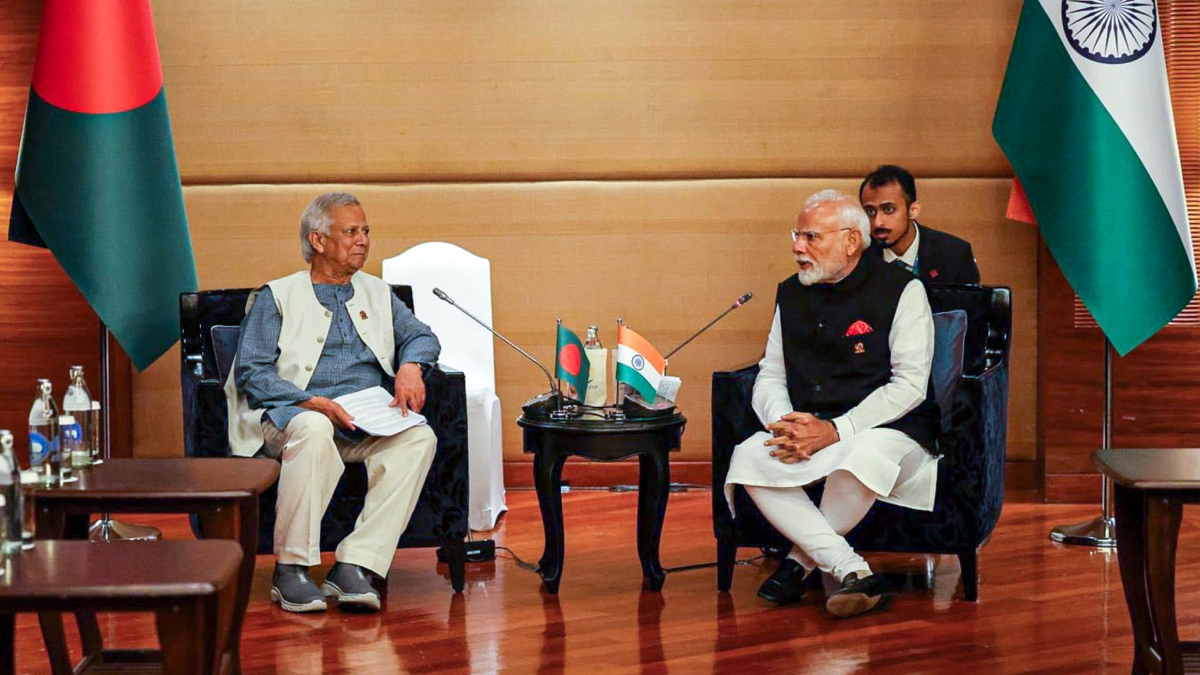OPINION | From concept to action: The transformative 6th BIMSTEC Summit
 Prime Minister Narendra Modi during a meeting with the Chief Adviser of Bangladesh Professor Muhammad Yunus on the sidelines of the 6th BIMSTEC Summit in Bangkok | PTI
Prime Minister Narendra Modi during a meeting with the Chief Adviser of Bangladesh Professor Muhammad Yunus on the sidelines of the 6th BIMSTEC Summit in Bangkok | PTI
On April 4, Prime Minister Narendra Modi held his first meeting with Dr. Mohammad Yunus, eight months into the latter's tenure as Chief Adviser to Bangladesh's interim government, on the sidelines of the 6th BIMSTEC Summit in Bangkok. Although the Modi-Yunus meeting dominated attention, the concept of BIMSTEC, despite the backdrop of diplomatic strain, remained steadfast and did not fade into the noise.
Bangkok hosted a transformative BIMSTEC Summit, signalling a pivotal shift in the approach to regional cooperation. For nearly two decades, the region has grappled with the challenges of realizing BIMSTEC's potential. However, the urgency of today's global realities demands renewed vigour and commitment to invigorate the organization. The focus has sharpened on trade disruptions, which carry not only a geoeconomic significance but also a profound geostrategic intent. In an era defined by global upheavals and uncertainties, countries must secure safe havens to protect their economies and future. And what better sanctuary than a region bound by shared geography, history, and aspirations?
Internal political issues forced Thailand to postpone the summit twice, but the government of Prime Minister Shinawatra remained committed to hosting a revitalized BIMSTEC Summit. Despite earlier setbacks, Thailand's leadership demonstrated resolve in steering the summit toward meaningful outcomes, with a focus on reinvigorating regional cooperation and advancing BIMSTEC's agenda. India and Thailand have collaborated closely to provide clear direction for BIMSTEC's future.
The recent remarks about India’s northeast’s landlocked status by Yunus during his visit to China met with strong backlash. Against this backdrop of bilateral nosediving, Modi and Yunus finally held their long-overdue face-to-face meeting. Although the meeting took place in a third country, the outcome was a shared projection that indicated a willingness to take the relationship forward trajectory.
Less talked-about outcomes of the Bangkok Summit underscored BIMSTEC's commitment to addressing regional challenges and fostering collaboration across multiple fronts. Among these was the focus on enhancing business-to-business engagement through proposals like establishing a BIMSTEC Chamber of Commerce, hosting annual business summits, and integrating digital payment systems such as India's UPI with regional frameworks to strengthen economic ties. Equally significant was the emphasis on environmental protection and climate action, with Bhutan spearheading initiatives in biodiversity, waste management, and climate change under an established Plan of Action, showcasing the region's shared commitment to sustainable development.
BIMSTEC leaders expressed solidarity and commitment to supporting those affected by the earthquake in Myanmar and Thailand. Recognizing the increasing frequency of natural disasters, India proposed a BIMSTEC Centre of Excellence for Disaster Management to enhance preparedness and coordinated response mechanisms.
The summit further reaffirmed its commitment to the BIMSTEC Master Plan for Transport Connectivity, which was adopted at the previous Colombo Summit, aiming to reinforce physical, digital, and institutional linkages across member nations.
Aligning with the broader goals outlined in the Bangkok Vision 2030, BIMSTEC nations signed the landmark Agreement on Maritime Transport Cooperation. The agreement strengthens regional maritime ties by offering national treatment to vessels, ensuring mutual assistance for crew and cargo, and introducing a dispute resolution mechanism, further advancing economic integration and connectivity among member states.
Ocean diplomacy within BIMSTEC carries significance beyond regional cooperation, as it could potentially unsettle China by strengthening maritime collaboration within member states, reducing reliance on external powers, promoting greater regional self-reliance and autonomy.
BIMSTEC nations have immense potential to accomplish significant progress without relying on external largesse. Addressing non-traditional security threats such as humanitarian crises, disaster relief, money laundering, illegal migration, and terrorism remains crucial, particularly as these challenges are concentrated within the region.
With India sharing a 6,500-kilometer-long shoreline with BIMSTEC countries, the importance of strengthening regional ties cannot be overstated. This geographic and strategic proximity underscores the need to integrate BIMSTEC more closely into India’s Act East policy and its broader Indo-Pacific vision, fostering greater regional cooperation and resilience in a rapidly evolving global landscape. Looking ahead, BIMSTEC should explore the possibility of inviting Singapore and Indonesia to join, enhancing its strategic influence and solidifying its role as a vital link between South Asia and Southeast Asia.
The call for revitalizing BIMSTEC with greater vigor is not just a choice—it is a demand of the times. In today's rapidly shifting global landscape, the necessity to breathe new energy into BIMSTEC has become both urgent and inevitable. The moment has arrived to elevate BIMSTEC from a promising idea to a dynamic force driving regional integration and sustainable development.
(Vaishali Basu Sharma is a security and economic affairs analyst)
The opinions expressed in this article are those of the author and do not purport to reflect the opinions or views of THE WEEK.
World